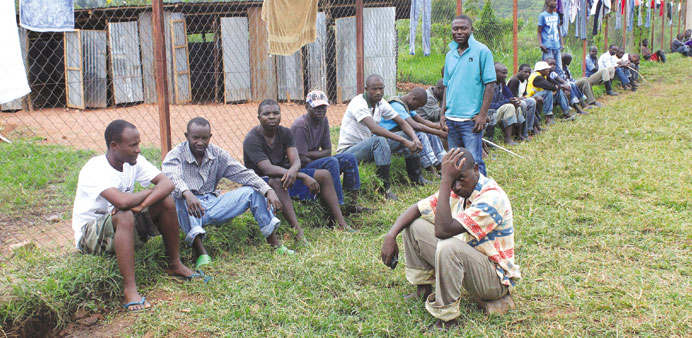Photo taken on April 30 shows M23 rebels who fled from the Democratic Republic of the Congo to the camp of Ngoma in southern Rwanda, about 100km from the capital Kigali.
By Stephanie Aglietti, AFP/Ngoma Camp, Rwanda
Former rebel fighter Claude Nsabiyuma spent last year in battles in the forest of eastern Democratic Republic of the Congo attacking government forces.
But now, like hundreds of other comrades with the DR Congo’s M23 rebels, the 20-year-old has turned his back on war, quitting the battlefields and crossing into neighbouring Rwanda.
“We want peace in Congo. I went to the forests in eastern DRC and joined the M23 rebels because my parents are refugees in Rwanda,” said Nsabiyuma, now being held at a camp for ex-combatants in eastern Rwanda.
“But I do not want to go back because we failed. I want to be a farmer,” said Nsabiyuma, lying on mattresses stretched out on the ground of the camp that houses some 700 ex-fighters, who Rwanda says fled DR Congo after being routed by a rival rebel faction.
After surrendering their guns to Rwandan troops, the ex-rebels are held in a special camp in a police complex, some 100km east of Rwanda’s capital Kigali.
Rwandan authorities, who took journalists and diplomats to visit the camp, sought to stem rumours that several hundred ex-fighters had returned to battle in DR Congo.
Rwanda’s minister for disaster management and refugees Seraphine Mukantabana has dismissed the allegations as “pure invention”.
The M23 is a rebel movement that has been fighting the Congolese army for a year in the rich mining province of North Kivu in the east of the vast country.
The United Nations and the Kinshasa government accuse Rwanda of backing the rebels, which Kigali strongly denies.
In the camp, all the men insist they have laid down their arms and become “civilians”, a line which repeated many times to visitors can sound rehearsed.
“We have voluntarily abandoned all activities that are related to war,” said ex-rebel Jedephonse Hakizimana, 24, as 10 comrades alongside him nod in agreement.
But it is hard to glean more information from the group.
The reasons why they first joined the rebels are not clear, nor why they later decided to abandon the fight or what may happen to them in the future.
“We do not know what we will do tomorrow,” one of them says.
As they wait, the former rebels who once terrorised whole populations in their homeland appear bored.
The camp is guarded by a small number of Rwandan military officers, but movement within the camp is not restricted, and they can chat with the outside world on mobile phones.
But other than that, there is little else to do.
Their living conditions are “good”, says Jedephonse Hakizimana, but he notes gloomily that the days are long.
“We bathe and sleep. That’s it,” he said, pointing towards a washing area and the dormitory where around 30 men sleep at night.
“We would like to play sport, but it is not possible,” he added.
Mukantabana stresses that all camp inmates have given written guarantees renouncing war, and displays a pile of forms.
“After two to five months of confinement they will be free,” he said, adding that release will be on a case-by-case basis, and that they could then apply for refugee status in Rwanda.
Amongst the ex-rebels, one man stands out. Dressed in a smart black suit, tie and polished shoes, M23’s former political commander Jean-Marie Runiga lives in a small brick house inside the camp.
Just days ago however, he was living in a villa in the Rwandan town of Gisenyi, on the border with DR Congo, but left after questions about his absence from his former soldiers.
Runiga insists that while his forces have given up armed conflict, their political struggle in DR Congo will continue.
“I will always be involved in the politics of DRC,” he said, although any return to his homeland in the near future seems unlikely.
Then, in a small appeal, he asks for an end to UN Security Council sanctions against him – including travel bans and asset freezes – that continue to dog him and other leaders of the M23 who have laid down their arms.

